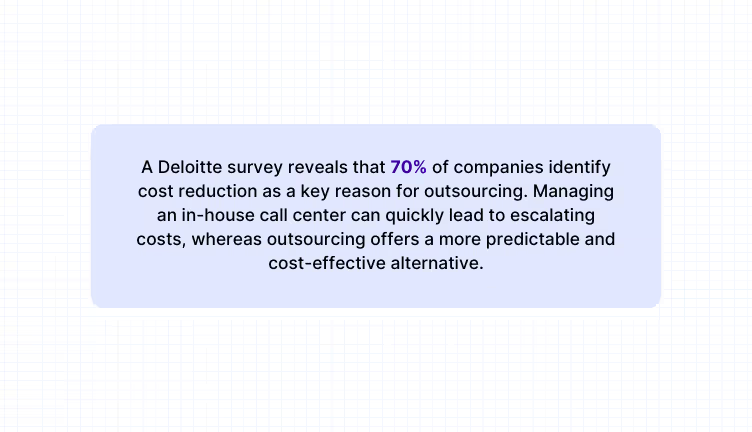Around 70% of companies choose to outsource primarily to cut costs, while 54% depend on external vendors to handle their customer service needs. Additionally, 40% of businesses find that outsourcing enables them to concentrate more on other critical aspects of their operations.
Outsourcing your contact center can be a game-changer, but it comes with challenges—especially in maintaining high-quality customer service. When your brand’s reputation is in the hands of distant agents, ensuring consistent service is crucial. This is where a robust quality tool becomes essential.
Contact center outsourcing helps you monitor performance, reduce costs, and ensure every customer interaction meets your brand’s standards.
This blog will explore why BPOs (Business Process Outsourcing) need quality tools to meet essential requirements, protect your brand's reputation, and help you decide between inbound and outbound call centers.
Enhance the quality of your outsourced call center
Challenges in Achieving Quality in Outsourced Call Centers

Outsourcing your call center operations offers many benefits but also unique challenges—especially when maintaining quality.
When your customer interactions are handled by a team outside of your direct control, ensuring consistent, high-quality service can feel like a constant uphill battle.
1. Cultural and Language Barriers

Outsourcing your call center often involves working with teams in different countries, where cultural norms, languages, and communication styles vary significantly.
These differences can lead to misunderstandings or miscommunications between agents and customers, resulting in a service experience that feels disconnected or impersonal.
Outsourced agents must understand and adapt to your customer base’s cultural context to deliver a seamless service experience.
2. Lack of Direct Oversight
When your customer service operations are outsourced, you cannot observe and manage day-to-day interactions directly.
This physical distance means you rely heavily on reports, call recordings, and performance metrics, which may not always provide the whole picture.
The inability to provide real-time coaching and immediate feedback can lead to inconsistent service quality, making it harder to maintain the high standards that your customers expect.
3. Balancing Cost with Quality
Cost reduction is a primary reason for outsourcing. However, the pressure to cut costs can sometimes lead to compromises in service quality.
For example, if an outsourcing partner is selected based solely on price, they may not have the resources or expertise to meet your quality standards.
Striking the right balance between affordability and quality is critical, but it’s a challenge that requires careful consideration and ongoing management.
4. Inconsistent Brand Representation
Outsourced agents may not have the same depth of understanding or emotional connection to your brand as an in-house team would.
This can result in customer interactions that don’t fully align with your brand’s voice, values, or customer service philosophy.
Ensuring that outsourced agents are well-trained and fully integrated into your brand culture is essential for maintaining a consistent and positive customer experience.
5. Communication Gaps
The physical and organizational distance between your business and the outsourced call center can lead to communication challenges.
Differences in time zones, work environments, and communication tools can cause delays, misinterpretations, and a lack of synchronization between your team and the outsourced agents.
These gaps can affect the flow of information and make it more challenging to manage and improve service quality in real-time.
6. Complex Performance Management
Managing the performance of an outsourced team is inherently more complicated than managing an in-house team.
You need to rely on the outsourcing partner’s tools and processes for monitoring agent performance, which may not always align with your quality management practices.
Without the right tools and agreements in place, ensuring that the outsourced team consistently meets your quality benchmarks can be challenging.
Effective performance management in an outsourced setting requires clear expectations, regular communication, and quality monitoring tools to bridge the gap between your standards and the outsourced team’s execution.
Don’t let quality challenges hinder your call center outsourcing.
Why are Quality Tools in Contact Center Outsourcing Important?
When you outsource your call center operations, you're entrusting a third party with a critical aspect of your business: direct customer interaction. Maintaining the high standards your customers expect becomes a daunting challenge without the right quality tools.
Quality tools provide the structure and oversight to ensure every customer interaction meets your brand’s standards. These tools allow you to monitor agent performance, identify areas for improvement, and provide targeted feedback, all in real-time. This proactive approach helps reduce errors, improve customer satisfaction, and ultimately safeguard your brand’s reputation.
Moreover, quality tools are crucial in optimizing call center outsourcing costs. With 100% calls being audited automatically, the need for more number of quality analysts decreases.
Identifying inefficiencies and enhancing agent productivity help you get the most value from your outsourcing investment. Whether you’re working with the best call center outsourcing companies or just starting, a strong focus on quality is non-negotiable.
Now, let’s understand the challenges to achieving quality while outsourcing call centers.
This blog is just the start.
Unlock the power of Convin’s AI with a live demo.

Key Benefits of Implementing Quality Tools

Implementing quality tools in contact center outsourcing offers several key benefits that directly impact the success and efficiency of your business process outsourcing (BPO) strategy.
Here’s how these tools can transform your operations:
1. Enhanced Customer Satisfaction
Quality tools allow you to monitor and improve the performance of outsourced agents in real-time, ensuring that they meet your brand’s standards.
By continuously refining service quality, you can deliver a consistent and exceptional customer experience, which is crucial for maintaining customer loyalty in competitive markets.
2. Cost Efficiency

While call center outsourcing costs are often lower than managing in-house teams, without proper quality tools, those savings can be lost due to inefficiencies or subpar service.
Quality tools help identify performance gaps and inefficiencies, enabling you to make data-driven decisions that reduce costs without compromising service quality.
3. Consistent Brand Representation
With the right quality tools, you can ensure that your outsourcing call center aligns with your brand’s values and messaging.
These tools facilitate comprehensive training and consistent feedback, helping outsourced agents embody your brand’s voice, whether you’re working with call center outsourcing companies in India or anywhere else.
4. Improved Agent Performance
Quality tools provide insights into individual agent performance, allowing you to tailor coaching and support to each agent’s needs. This leads to improved performance, higher agent morale, and a more productive BPO business environment.
5. Scalability and Flexibility
Maintaining quality across larger teams and multiple locations can be challenging as your business grows.
Quality tools make it easier to scale your business processing outsourcing operations by providing centralized oversight and standardized processes, ensuring that quality remains consistent, no matter how large or geographically dispersed your team becomes.
6. Data-Driven Decision Making
Quality tools generate valuable data and insights that help you understand trends, customer pain points, and areas for improvement.
This data is essential for making informed decisions about your business outsourcing process, optimizing operations, and enhancing overall service quality.
7. Compliance and Risk Management
Compliance with industry regulations and company policies is crucial in call center outsourcing. Quality tools help ensure that agents adhere to these standards, reducing the risk of non-compliance and the potential legal or financial repercussions.
8. Higher ROI
Quality tools improve service quality, reduce inefficiencies, and maintain customer satisfaction, ultimately leading to a higher return on investment (ROI) for your outsourcing call center operations.
Whether partnering with the best call center outsourcing companies or managing a smaller-scale operation, quality tools are integral to maximizing the value of your outsourcing efforts.
Measuring and Enhancing ROI through Quality Improvements

Quality improvements play a pivotal role in maximizing ROI. Let’s dive into some of the implementations that you can take advantage of:
1. Comprehensive Performance Monitoring

Auto QA tools enable 100% auditing of customer interactions, providing a complete and detailed overview of call center performance. Unlike manual QA, which only samples a small percentage of calls, automated systems review every interaction.
This comprehensive monitoring ensures no critical data is missed, allowing for more accurate assessments and quicker identifying areas needing improvement. By capturing a full picture of performance, businesses can make more informed decisions that directly impact ROI.
2. Enhanced Agent Performance and Efficiency
Auto QA identifies issues and provides real-time feedback and coaching to agents. This immediate guidance helps agents improve their performance on the spot, leading to higher efficiency and better customer interactions.
Enhanced agent performance translates to fewer escalations, higher customer satisfaction, and, ultimately, increased revenue—all contributing to a more substantial ROI.
3. Cost Savings through Automation
Automating the quality assurance process reduces the need for extensive manual labor, which is time-consuming and prone to human error. Businesses can significantly cut operational costs by eliminating the manual effort required for call evaluations and streamlining the coaching process.
When combined with the contact center's improved efficiency and effectiveness, these cost savings result in a higher return on investment.
4. Data-Driven Decision Making

The insights generated by Auto QA tools are invaluable for driving data-driven decisions. These tools analyze large volumes of interactions to identify trends, patterns, and areas for improvement.
With this data, businesses can refine their processes, optimize resource allocation, and enhance customer service strategies—all of which contribute to a more robust ROI. Continuous monitoring and real-time analytics ensure the contact center remains aligned with business goals and adapts swiftly to changes.
5. Compliance and Risk Management
Image: Mask all the brand names in this screenshot.

Automated QA tools like Convin are crucial for ensuring compliance with industry regulations and company policies. These tools help mitigate risks and avoid costly penalties by flagging compliance violations in real-time.
Maintaining a solid compliance record protects the business financially and preserves its reputation, further strengthening ROI.
Final Thoughts
Staying ahead means not just meeting but exceeding customer expectations. Quality tools, mainly Automated Quality Assurance (Auto QA), are the cornerstone of achieving this.
They provide insights and capabilities to enhance agent performance, ensure compliance, and drive significant cost efficiencies.
As a contact center leader, your ability to leverage these tools will determine the success and sustainability of your outsourcing strategy.
Don’t just keep up with the competition—lead the way in customer service excellence.
Book a demo now to see how our innovative solutions can help you transform your contact center into a productivity powerhouse.
Frequently Asked Questions
1. What is call center outsourcing?
Contact center outsourcing involves hiring a third-party call center outsourcing company to handle customer service operations, such as answering calls, responding to emails, and managing chat support for your business.
2. How much does it cost to outsource a call center?
The cost to outsource a call center varies widely depending on factors like location, the complexity of services, and the volume of interactions. Costs can range from $8 to $30 per hour per agent, with offshore call center outsourcing services generally more affordable.
3. What is customer service outsourcing?
Customer service outsourcing refers to contracting an external provider to manage customer interactions, including support, inquiries, and issue resolution, to improve efficiency and reduce operational costs.
4. What is the difference between a BPO and a contact center?
A BPO (Business Process Outsourcing) is a broader term that covers outsourcing various business processes, including HR, accounting, and IT services. A contact center, on the other hand, specifically focuses on handling customer communications like phone calls, emails, and chats.




.webp)



.avif)